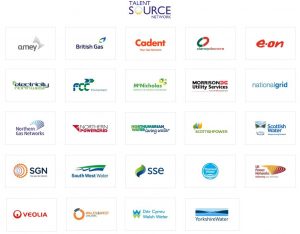- New employers have joined the initiative to increase visibility with underrepresented groups across the UK
- The Energy & Utilities Skills Partnership progresses its commitment to deliver workforce resilience through developing a pipeline of talent
Yorkshire Water and Veolia have joined Amey, Cadent, SGN, Thames Water and Welsh Water, as the newest leading employers delivering Talent Source Network, the sector’s digital attraction platform. Collaborating on all aspects of the initiative, leading employers have set key priorities, agreed the approach and are using their collective reach to engage with talent. Following a successful pilot year, The Talent Source Network employer base has challenged itself to maintain momentum, build on the current successes and increase employer participation this year. Talent Source Network is unique in the way it brings employers, talent and strategic partners together, simplifying accessibility to a complex market.
Committed to raising visibility with underrepresented groups, the network has collaborated to engage women, those from Black and Minority Ethnic backgrounds (BAME), military leavers and skilled workers at risk of redundancy. Early indicators show success in attracting more women to Talent Source Network’s website to learn about the sector. With over 55% of the 31,000 visits to the website being from female users during the first two months of 2018, the potential to challenge UK stereotypes and address gender imbalances is clear.
Providing insight into the sector and access to thousands of jobs, the campaign simplifies a complex jobs market for potential talent. With innovative approaches to marketing directly to the network’s target audiences, the initiative has driven over 3,500 applications into the sector since January 2017.

TSN’s employers have also reacted swiftly to offer support to those at risk of redundancy at Carillion. In partnership with the Department for Work and Pensions, the employers were quickly able to share 850 vacancies with affected personnel. The rapid response and efficiency demonstrated was a key success factor and enabled employers to recognise the power of collaboration and the ease of mobilising effort when required.
Basil Scarsella, Chief Executive of UK Power Networks, is also chair of the Energy & Utilities Skills Partnership,* a collaboration of sector employers that launched TSN in February 2017. He said: “We welcome the commitment from our members to work together to attract the people the sector needs to be sustainable. We have such a promising mass talent attraction initiative that has been strengthened further by the addition of new employers.”
Kate Davies, Chief Operating Officer at Energy & Utility Skills,** said: “The addition of five new employers to TSN demonstrates our sector’s commitment to working together to tackle talent issues. The Workforce Renewal and Skills Strategy*** demonstrates that the UK’s energy and utilities sector offers a huge range of exciting and challenging careers and it is critical that this is visible to a diverse range of emerging talent.”
Paul Macfarlane, HR Director at Amey, one of TSN’s new employers, added: “As part of our commitment to investing in people and skills, and our vision for sustainability, we are proud to be supporting TSN.
“Amey is a people business that has many great opportunities. We are looking forward to sharing those and joining a strong line up of sector employers that are pooling their resources to offer varied, exciting and sustainable careers for new entrants in a sector that is of strategic importance to the UK economy.”
The ability to engage with new and younger audiences is key to the sector’s ability to deliver its commitments to the National Infrastructure & Construction Pipeline.****
The sector’s 500,000 UK workforce is ageing and the Skills Strategy reports that close to 20% of it will retire within the next decade, which contributes to a total of 221,000 roles that will need to be filled by 2027. Currently 35% of its vacancies are hard to fill due to skills shortages. This is the highest percentage of any UK sector – the national average is 23%. In addition, the sector will meet further challenges: it will require more advanced digital and engineering skills as the UK moves towards a smart energy system.
Now the pilot is complete, the Skills Partnership is actively encouraging other leading sector employers to join TSN and has already welcomed several expressions of interest.
Notes to Editors:
Contact:
Veron Graham, PR Manager – Energy & Utility Skills
E: veron.graham@euskills.co.uk T: 0121 713 8204 M: 07834 651 311
* The Energy & Utilities Skills Partnership is a collective of 29 leading sector employers that are working together to secure the continual seamless delivery of the wider sector’s services across the UK. The Skills Partnership’s mission is to “ensure a safe, skilled and sustainable workforce provides the essential services that our customers seek and meets the UK’s needs from the energy and utilities infrastructure.”
** Energy & Utility Skills is at the forefront of bringing our industry leaders together to identify and address the skills challenges our sector faces. It provides membership, assurance and skills solutions to help employers attract, develop and retain a sustainable skilled workforce to ensure the seamless delivery of its essential services. It collaborates with employers to support their workforce needs and sector-wide workforce mobility. Energy & Utility Skills was a driving force behind the creation of the Energy & Utilities Skills Partnership.
*** The Workforce Renewal and Skills Strategy is the first-ever coherent strategic plan for the continued delivery of essential energy and utility services to 65 million people across Scotland, Wales, England and Northern Ireland every day. It was released in February 2017 and was co-written by the Skills Partnership.
**** Energy and utilities combined account for the greatest share of the UK Infrastructure and Construction Pipeline (2017/18 – 2020/21). The combined share is 43% (£104.8bn), which is significantly greater than the next largest category – transport at £78.5bn, which is responsible for 29% of 2017/18 – 2020/21 Pipeline.
